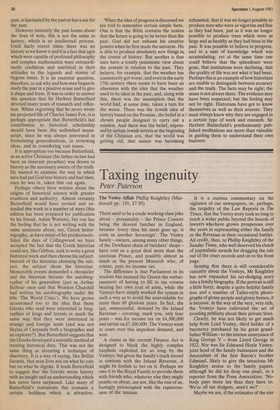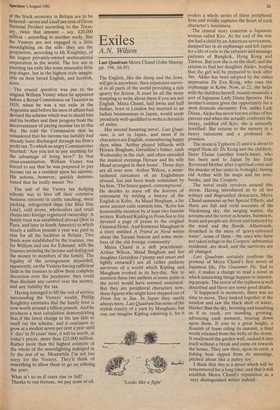Taxing ingenuity
Peter Paterson
The Vestey Affair Phillip Knightley (Macdonald pp. 159, £7.95) There used to be a crude working-class joke about — presumably — the Prince Consort being the dearest butcher in England, because 'every time his meat goes up, it costs us another Sovereign'. The Vestey family — owners, among many other things, of the Dewhurst chain of butchers' shops — have cost us a great deal more than the uxorious Prince, and possibly almost as much as the present Monarch who, of course, pays no income tax.
The difference is that Parliament in its wisdom has excused the Queen the embarrassment of having to fill in tax returns bearing her own coat of arms, while the Vesteys have simply worked the system in such a way as to avoid the unavoidable for more than 60 glorious years. In fact, the last, unsuccessful, demand by the Inland Revenue — covering, mark you, only four years — was for income tax on £4,300,000 and surtax on £7,300,000. The Vesteys went to court over this impudent demand, and won.
A clause in the current Finance Act is designed to block the highly complex loophole exploited for so long by the Vesteys, but given the family's track record in contests with the Inland Revenue, it might be foolish to bet on it. Perhaps we owe it to the Royal Family to provide them with friends who, whatever else they might prattle on about, are not, like the rest of us, boringly preoccupied with the rapaciousness of the taxman. It is a curious commentary on the vigilance of our newspapers, or, perhaps, the turgidity of the Law Reports in The Times, that the Vestey story took so long to reach a wider public beyond the hoards of lawyers who,have grown prosperous over the years in representing either the family or the Revenue in their occasional battles. All credit, then, to Phillip Knightley of the Sunday Times, who well deserved his clutch of journalistic awards for dragging the tale out of the court records and on to the front page.
Sensing that there is still considerable curiosity about the Vesteys, Mr Knightley has now expanded his tax-dodging story into a family biography. If the portrait is still a little fuzzy, despite a quite helpful family tree and a number of Tatler-style photographs of glossy people and glossy horses, it is because, in the way of the very, very rich, the Vesteys have cultivated the art of avoiding publicity about their private lives.
Clearly, he was not likely to get much help from Lord Vestey, third holder of a baronetcy purchased by his great grandfather William— to the intense annoyance of King George V — from Lloyd George in 1922. Nor was Sir Edmund Hoyle Vestey, joint head of the family businesses and the descendant of the first Baron's brother Edmund, likely to give the tenacious Mr Knightley access to the family papers, although he did let drop one pearl, to a reporter from the Press Association: 'Nobody pays more tax than they have to. We're all tax dodgers, aren't we?'
Maybe we are, if the estimates of the size of the black economy in Britain are to be believed — seven and a half per cent of Gross National Product according to the Treasury, twice that amount — say, £20,000 million — according to another study. But the Vesteys are not engaged in a little moonlighting on the side: they are the proprietors, according to Mr Knightley, of the largest privately-owned multinational Corporation in the world. The live not in Yearning tax exile like some miserable little pop singer, but in the highest style imaginable on their broad English, and Scottish, acres.
The crucial question was put to the original William Vestey when he appeared before a Royal Commission on Taxation in 1919, when he was a tax exile in the Argentine and before his men of affairs had devised the scheme which was to shield him and his brother and their progeny from the inconvenience of paying income tax to this day. He told the Commission that he considered that his income tax liability had already been discharged through his firm's profit tax. To which an angry Commissioner retorted: 'Are you not to pay anything for the advantage of living here?' In that cross-examination, William Vestey was forced to say that he was prepared to pay income tax as a resident upon his income. His actions, however, quickly demonstrated that he really meant 'No.'
The nub of the Vestey tax dodging scheme was to hive off their extensive business interests in cattle ranching, meat Packing, refrigerated ships (the Blue Star Line), cold stores, wholesalers and retail chains into foreign registered ownership. A family trust was established abroad (first in Paris, and later in South America) to which nearly a million pounds a year was paid as rent for all the facilities in Britain. Two funds were established by the trustees, one for William and one for Edmund, with the trustees investing the income and doling out the money to members of the family. The legality of the arrangement depended, apparently, on the Vesteys having sufficient faith in the trustees to allow them complete discretion over the payments: they could thus disclaim any control over the money, and any liability for tax.
Having managed to lift the veil of secrecy surrounding the Vesteys' wealth, Phillip Knightley estimates that the family trust is now worth around a billion pounds. And he produces a neat calculation demonstrating that if the latest change in the law fails to snuff out the scheme, and it continues to grow at a modest seven per cent a year until it 'dies' in 50 years' time, it will be worth, at today's prices, more than £25,000 million. Rather more than the highest estimate of the whole of the moonlighting indulged in by the rest of us. Meanwhile I'm not too sorry for the Vesteys. They'll think of something to allow them to go on echoing the poet: What is't to us if taxes rise or fall? Thanks to our fortune, we pay none at all.



































 Previous page
Previous page